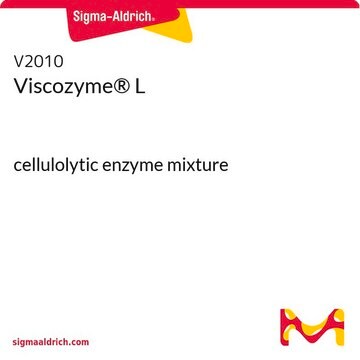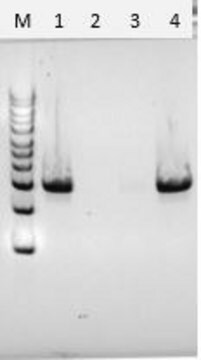L8757
Lysing Enzymes from Rhizoctonia solani
crude powder
Synonym(s):
Kitalase
Sign Into View Organizational & Contract Pricing
All Photos(1)
About This Item
UNSPSC Code:
12352204
Recommended Products
form
crude powder
storage temp.
2-8°C
Application
Lysing enzymes at a concentration of 1mg/ml can be used for preparation of protoplasts from Rhizoctonia solani.
Biochem/physiol Actions
Main enzymatic acitivity is β−(1-3)-glucanase, also reported to contain protease, pectinase, and amylase activities.
comparable product
Product No.
Description
Pricing
Storage Class Code
13 - Non Combustible Solids
WGK
WGK 3
Flash Point(F)
Not applicable
Flash Point(C)
Not applicable
Personal Protective Equipment
dust mask type N95 (US), Eyeshields, Gloves
Certificates of Analysis (COA)
Search for Certificates of Analysis (COA) by entering the products Lot/Batch Number. Lot and Batch Numbers can be found on a product’s label following the words ‘Lot’ or ‘Batch’.
Already Own This Product?
Find documentation for the products that you have recently purchased in the Document Library.
Expression of a cephalosporin C esterase gene in Acremonium chrysogenum for the direct production of deacetylcephalosporin C
Basch, J., et al
Journal of Industrial Microbiology, 31(11), 531-539 (2004)
Molecular characterization of a Stagonospora nodorum lipase gene LIP1
Feng, J., et al
Plant Pathology, 60(4), 698-708 (2011)
D Tsuchiya et al.
Phytopathology, 91(4), 354-360 (2008-10-24)
ABSTRACT Cytological karyotypes with mitotic metaphase chromosomes were analyzed for Cochliobolus heterostrophus, C. carbonum, and C. sativus by the germ tube burst method (GTBM). Prior to karyotyping, procedures of GTBM suitable to Cochliobolus were established by examining several crucial conditions
Structural characterization of a neutral antitumour β-D-glucan extracted with hot sodium hydroxide from cultured fruit bodies of Grifola frondosa.
Iino, K., et al
Carbohydrate Research, 141(1), 111-119 (1985)
Tung-Hsen Liu et al.
New biotechnology, 27(1), 64-69 (2009-09-01)
Novozym 234 was the most frequently used enzyme for production of Rhizoctonia solani protoplasts. Since manufacture of this enzyme was discontinued in the late 1990s, a new procedure was developed by testing lytic enzymes from Sigma and by examining factors
Our team of scientists has experience in all areas of research including Life Science, Material Science, Chemical Synthesis, Chromatography, Analytical and many others.
Contact Technical Service





